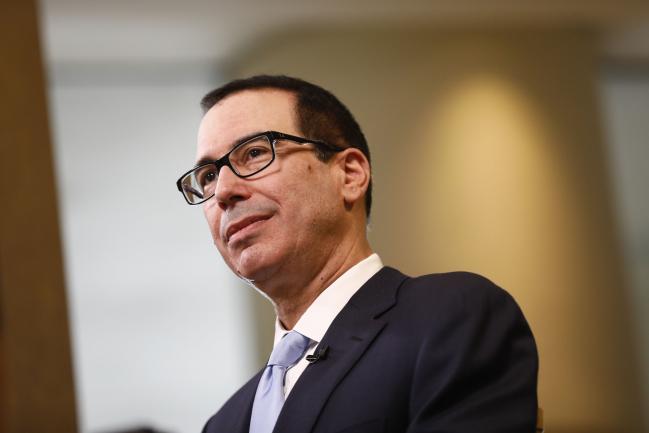(Bloomberg) -- Two days of U.S.-China trade discussions ended in Beijing on Friday with an agreement to keep on talking, and little else.
China’s official Xinhua News Agency reported Friday afternoon that both sides reached a consensus on some trade issues, without providing details. They also acknowledged major disagreements on some matters and will continue communicating to work toward making more progress.
The U.S. delegation, led by Treasury Secretary Steven Mnuchin, asked China to decrease the trade deficit by at least $200 billion by the end of 2020 compared with 2018, according to a sent ahead of the trade talks in Beijing that was document seen by Bloomberg News. By early afternoon Friday neither side had flagged plans to give a briefing on the discussions, and the American team was scheduled to depart Friday evening.
Earlier, Mnuchin said that the U.S. and China had been having a “very good conversation,” without elaborating. While China hasn’t indicated any detail on what it may be prepared to agree to, a senior official sounded a defiant tone ahead of the meeting, and the state news agency warned against “unreasonable demands.” Foreign ministry spokeswoman Hua Chunying said at a Friday afternoon briefing there’s no specific information on the talks.
The closed-door discussions between President Donald Trump’s economic team and officials in Beijing began Thursday, amid a ban on China’s largest media outlets reporting any material beyond official press releases related to the talks, according to people familiar with the matter.
The U.S. tempered expectations of a major breakthrough from the discussions, which were expected to focus on concerns over China’s state-driven economy, forced technology transfers and America’s widening trade deficit with China. Underscoring the friction, a U.S. report released Thursday showed the trade gap with China surged by 16 percent to more than $91 billion in the first quarter of this year.
A senior Chinese government official, who asked not to be named, said before the talks the government won’t accept U.S. preconditions for negotiations such as abandoning its long-term advanced manufacturing ambitions or narrowing the trade gap by $100 billion.
During the second day of discussions, across town at Beijing’s Great Hall of the People, President Xi Jinping indicated China will continue to embrace globalism, saying it wants to actively take part in world governance. Those who reject the world will be rejected by the world, he said in a speech commemorating the 200th anniversary of Karl Marx’s birth.
Analysts weren’t optimistic about potential outcomes beyond the two countries possibly delaying on the threat of tit-for-tat tariffs.
“Our expectations are low. The U.S. negotiating position is unclear -- indeed it’s not even clear if the U.S. representatives have a unified view on what they want to achieve,” Tom Orlik, chief economist at Bloomberg Economics in Beijing, wrote in a report. “The Chinese side has already made concessions and won’t rush to make more. The past few weeks have shown that markets can be roiled by tariff chatter, so that’s certainly a possibility in the next couple of days.”
Read this special Bloomberg Economics’ report on currencies in a trade war.
The meetings are an opportunity for the two sides to exchange their views after the official channel for U.S.-China high-level economic talks were suspended last year.
Trump has threatened to impose tariffs on as much as $150 billion of Chinese goods to punish China over its IP practices if the talks fail to yield progress, a move that China said would spark retaliation in equal measure on American exports.
The U.S. is also looking at ways to crack down on Chinese investment in the U.S. in an effort to balance the scales and protect sensitive technology. China has announced tariffs on $3 billion of U.S. goods such as pork and wine in retaliation for new global steel and aluminum tariffs imposed by Trump. The U.S. levies were aimed at tackling China’s overcapacity.
Trump sounded a more positive note as his economic team entered the talks in Beijing. “Our great financial team is in China trying to negotiate a level playing field on trade!,” Trump tweeted as they arrived in Beijing. “I look forward to being with President Xi in the not too distant future. We will always have a good (great) relationship!”
Xinhua said in a commentary Wednesday that the U.S. should show sincerity in trade talks instead of making unreasonable demands. It said China will take retaliatory steps of equal intensity if the U.S. puts tariffs on its goods after the talks.
The discussions should involve equal-footed consultation and mutual respect, and work toward mutual benefits, a Chinese foreign ministry spokeswoman told reporters in a regular briefing on Thursday. Chinese Vice Premier Liu He, Xi’s top economic adviser, is leading his nation’s delegation.
